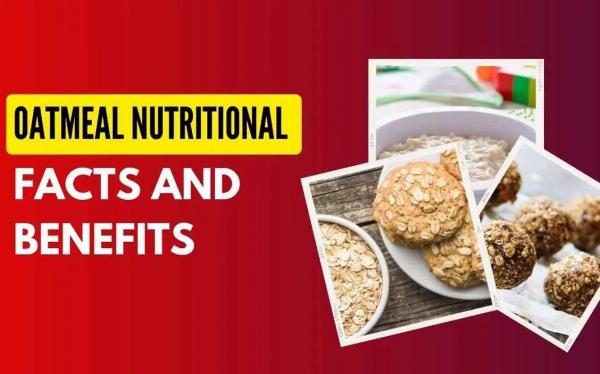Oatmeal Nutritional Facts and benefits

Strong 8k brings an ultra-HD IPTV experience to your living room and your pocket.
**The Nutritional Facts and Health Benefits of Oatmeal: A Comprehensive Guide**
Oatmeal has long been recognized as a nutritious breakfast staple, but its benefits extend far beyond just being a morning meal option. Packed with essential nutrients and versatile enough to be included in various dishes, oatmeal offers a plethora of health benefits that contribute to overall well-being. In this comprehensive guide, we'll delve into the nutritional facts and explore the numerous advantages that oatmeal brings to the table.
**Nutritional Facts of Oatmeal**
Oatmeal is primarily composed of oats, a whole grain rich in essential nutrients. A typical serving of cooked oatmeal (about half a cup of dry oats) provides approximately:
- Calories: 150
- Carbohydrates: 27 grams
- Protein: 5 grams
- Fat: 3 grams
- Fiber: 4 grams
- Iron: 10% of the Recommended Daily Allowance (RDA)
- Magnesium: 16% of the RDA
- Phosphorus: 14% of the RDA
Additionally, oatmeal contains various vitamins and minerals, including B vitamins, zinc, and manganese, albeit in smaller amounts. It's worth noting that these nutritional values may vary depending on the type of oats and any additional ingredients added during preparation.
**Health Benefits of Oatmeal**
1. **Rich in Fiber**: Oatmeal is an excellent source of dietary fiber, particularly soluble fiber known as beta-glucan. This type of fiber has been linked to numerous health benefits, including improved digestion, reduced cholesterol levels, and better blood sugar control.
2. **Heart Health**: The high fiber content in oatmeal, particularly beta-glucan, is beneficial for heart health. Studies have shown that regular consumption of oats can help lower LDL cholesterol levels, thus reducing the risk of heart disease and stroke.
3. **Weight Management**: Oatmeal's fiber and protein content helps promote satiety, keeping you feeling full for longer periods and reducing overall calorie intake. This makes it a valuable addition to weight management and weight loss diets.
4. **Blood Sugar Control**: The soluble fiber in oatmeal slows down the absorption of sugar into the bloodstream, helping to stabilize blood sugar levels. This can be especially beneficial for individuals with diabetes or those at risk of developing the condition.
5. **Improved Gut Health**: The fiber in oatmeal acts as a prebiotic, nourishing beneficial bacteria in the gut and promoting a healthy digestive system. A healthy gut microbiome is essential for overall health and immunity.
6. **Antioxidant Properties**: Oats contain various antioxidants, including avenanthramides, which have anti-inflammatory and anti-itching properties. These antioxidants help protect cells from damage caused by free radicals and may reduce the risk of chronic diseases such as cancer and diabetes.
7. **Nutrient Density**: Oatmeal is not only a good source of fiber but also provides important vitamins and minerals, including iron, magnesium, and phosphorus, which are essential for various bodily functions.
8. **Versatility**: Oatmeal is incredibly versatile and can be customized to suit individual tastes and dietary preferences. Whether enjoyed as a warm bowl of porridge topped with fruits and nuts or used in baked goods such as cookies and muffins, oatmeal can be incorporated into a wide range of dishes.
9. **Budget-Friendly**: Oatmeal is an affordable and budget-friendly food option that provides excellent nutritional value. It's readily available in most grocery stores and can be purchased in bulk, making it an economical choice for families and individuals alike.
10. **Sustainable and Environmentally Friendly**: Oats are relatively environmentally friendly compared to other cereal crops, requiring less water and fertilizer to grow. Choosing oatmeal as part of your diet can contribute to sustainable food practices and reduce your carbon footprint.
In conclusion, oatmeal is not just a delicious and comforting breakfast choice but also a nutritional powerhouse packed with essential nutrients and health benefits. Whether you're looking to improve heart health, manage weight, or simply enjoy a wholesome meal, incorporating oatmeal into your diet can have a positive impact on your overall well-being. So next time you're planning your meals, consider adding oatmeal to the menu for a nutritious and satisfying option.
Note: IndiBlogHub features both user-submitted and editorial content. We do not verify third-party contributions. Read our Disclaimer and Privacy Policyfor details.


